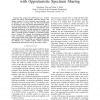Free Online Productivity Tools
i2Speak
i2Symbol
i2OCR
iTex2Img
iWeb2Print
iWeb2Shot
i2Type
iPdf2Split
iPdf2Merge
i2Bopomofo
i2Arabic
i2Style
i2Image
i2PDF
iLatex2Rtf
Sci2ools
114
Voted
GLOBECOM
2007
IEEE
2007
IEEE
Performance Analysis of a Wireless Network with Opportunistic Spectrum Sharing
— We analyze the performance of a wireless system that allows opportunistic spectrum sharing. The system consists of a set of primary users sharing a set of channels over a coverage area. The resources allocated to the primary users are shared opportunistically with a set of secondary users. The secondary users are capable of detecting channels that are unused by the primary users and then making use of the idle channels. If no channel is available for a secondary call, the call waits in a buffer until either a channel becomes available or a maximum waiting time is reached. We compute the blocking probabilities, mean reconnection probability, channel utilization, and total carried traffic in the system. Our results suggest that opportunistic spectrum sharing can significantly improve the efficiency of a wireless system, without negatively impacting the performance seen by the primary users.
GLOBECOM 2007 | Opportunistic Spectrum Sharing | Primary Users | Secondary Users | Telecommunications |
Related Content
| Added | 02 Jun 2010 |
| Updated | 02 Jun 2010 |
| Type | Conference |
| Year | 2007 |
| Where | GLOBECOM |
| Authors | Shensheng Tang, Brian L. Mark |
Comments (0)

